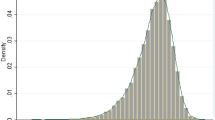Abstract
Since the early 1970s the importance of mothers’ socioeconomic characteristics on their children’s educational and occupational attainment has been acknowledged. However, it is not clear if fathers’ characteristics have a stronger influence because men usually have stronger attachments to the labour market, or alternatively mothers’ characteristics are more important because of their greater role in children’s socialization. This study addresses this question by comparing the influence of father’s and mother’s education and occupation on student performance in literacy and numeracy using data from 30 countries. The impact of mother’s education is usually greater or comparable to that of father’s education. In contrast, substantially stronger effects for mother’s occupational status compared to father’s were rare. In most countries the impact of mother’s socioeconomic characteristics (education plus occupation) on student performance is comparable to that for father’s. Of the four indicators of socioeconomic background, father’s occupational status and mother’s educational attainment tend to have stronger effects, although many countries do not conform to this pattern. There are indications that the relative importance of mother’s characteristics have increased over time.
Similar content being viewed by others
Notes
Assortative mating is the tendency for the reproductive pairing of individuals to have more traits in common than would likely be the case if mating were random. This is especially the case for education.
This conclusion must remain tentative since it is based on few studies. The finding that mother’s education has similar effects to father’s education on university education among adoptees suggests mother’s education may have a direct causal effect in some contexts.
In the analysis of the PISA data the coefficient for age is invariably small, negative and most often statistically not significant.
References
Acker, J. (1973). Women and social stratification: A case of intellectual sexism. American Journal of Sociology, 78, 936–945.
Behrman, J. R., & Rosenzweig, M. R. (2002). Does increasing women’s schooling raise the schooling of the next generation? American Economic Review, 92(1), 323–334.
Bjorklund, A., Lindahl, M., & Plug, E. (2006). The origins of intergenerational associations: Lessons from Swedish adoption data. Quarterly Journal of Economics, 121(3), 999–1027.
Comber, L. C., & Keeves, J. P. (1973). Science education in nineteen countries: International studies in evaluation I. New York: John Wiley & Sons.
Crook, C. J. (1995). The role of mothers in the educational and status attainment of Australian men and women. Australian and New Zealand Journal of Sociology, 31(2), 45–73.
Erikson, R. (1984). Social class of men, women and families. Sociology, 18, 500–514.
Ganzeboom, H. B. G., & Treiman, D. J. (1996). Internationally comparable measures of occupational status for the 1988 international standard classifications of occupations. Social Science Research, 25, 201–239.
Goldthorpe, J. H. (1983). Women and class analysis: In defence of the conventional view. Sociology, 17(4), 465–488.
Goldthorpe, J. H. (1984). Women and class analysis. A reply to the replies. Sociology, 18(4), 491–499.
Kalmijn, M. (1994). Mother’s occupational status and children’s schooling. American Sociological Review, 59(2), 257–275.
Keeves, J. P., & Saha, L. J. (1992). Home background factors and educational outcomes. In J. Keeves (Ed.), The IEA study of science III: Changes in science education and achievement 1970 to 1984 (pp. 165–186). Oxford UK: Pergamon.
Korrup, S. (2000). Mothers and the process of social stratification. The Netherlands: Interuniversity Center for Social Science Theory and Methodology.
Korrup, S. E., Ganzeboom, H. B. G., & Lippe, T. V. D. (2002). Do mothers matter? A comparison of models of the influence of mother’s and father’s education and occupational status on children’s educational attainment. Quality and Quantity, 36(1), 17–42.
OECD. (1999). Classifying educational programmes. Manual for ISCED-97 implementation in OECD Countries. Paris: Organisation for Economic Co-operation and Development.
OECD. (2001). Knowledge and skills for life. First results from the OECD programme for international student assessment. Paris: Organisation for Economic Co-operation and Development.
OECD. (2002). PISA 2000 technical report. Paris: Organisation for Economic Co-operation and Development.
Plug, E. (2004). Estimating the effect of mother’s schooling on children’s schooling using a sample of adoptees. American Economic Review, 94(1), 358.
Whitt, H. P. (1986). The sheaf coefficient: A simplified and expanded approach. Social Science Research, 15, 174–189.
Author information
Authors and Affiliations
Corresponding author
Appendix
Appendix
Rights and permissions
About this article
Cite this article
Marks, G.N. Are Father’s or Mother’s Socioeconomic Characteristics More Important Influences on Student Performance? Recent International Evidence. Soc Indic Res 85, 293–309 (2008). https://doi.org/10.1007/s11205-007-9132-4
Received:
Accepted:
Published:
Issue Date:
DOI: https://doi.org/10.1007/s11205-007-9132-4




